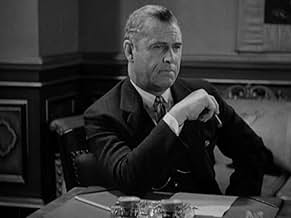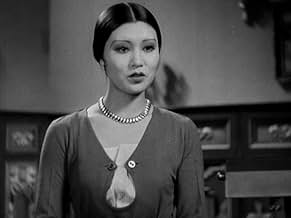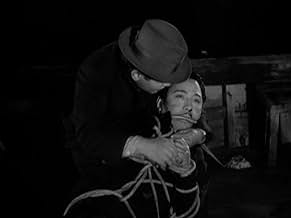AVALIAÇÃO DA IMDb
6,2/10
949
SUA AVALIAÇÃO
Adicionar um enredo no seu idiomaA hatchet man is ordered to kill his close friend for the sake of Tong.A hatchet man is ordered to kill his close friend for the sake of Tong.A hatchet man is ordered to kill his close friend for the sake of Tong.
- Direção
- Roteiristas
- Artistas
- Prêmios
- 2 vitórias no total
J. Carrol Naish
- Sun Yat Ming
- (as J. Carroll Naish)
Edward Peil Sr.
- Bing Foo
- (as Eddie Piel)
Anna Chang
- Sing Girl
- (não creditado)
Blanche Friderici
- Madame Si-Si
- (não creditado)
Willie Fung
- Notary Fung Loo
- (não creditado)
- …
Anne Howard
- Young Girl
- (não creditado)
Ralph Ince
- 'Big Jim' Malone
- (não creditado)
Otto Lederer
- Pawnbroker
- (não creditado)
James B. Leong
- Tong Member
- (não creditado)
Gladys Lloyd
- Fan Yi
- (não creditado)
- Direção
- Roteiristas
- Elenco e equipe completos
- Produção, bilheteria e muito mais no IMDbPro
Avaliações em destaque
The Hatchet Man (1932)
So burdened with ethnic slandering—most of it "unintentional" at least—this movie is almost impossible to watch fairly. The basic story of inter-clan fighting and murder in the Chinese community (in San Francisco) is meant no doubt to have echoes in Italian mobster killings, and therefore have a wider appeal. But when the main characters are played by very non-Chinese talents (a product of the prejudice in Hollywood at the time), there is a constant woe and disbelief on many levels.
Of course, these problems are exactly why a "student' of early Hollywood should watch this. This is a way to get some sense of the problem these movies present. And there are additional reasons to see this—mainly the two really famous actors of the period doing their best to be Chinese. Edward G. Robinson is of course one of the greats of the era, an odd but searingly talented actor, and he plays well the head of one of the Chinese clans (or tongs). His wife has a smaller role but important —and so Loretta Young, a rising, fresh star, does what she can.
Nothing can redeem all this. The title refers to the violence of the subculture, where the solution for dishonor is death (by hatchet, literally).
There is the simplest of attempts to show how the Chinese were assimilating at the time. In a way the movie shows some shred of real life for the Chinatowns of America. The secondary theme here is love, and a kind of arranged marriage. This conflicts in different ways and Robinson, playing a Westernized immigrant, faces one aspect of this New World he can't quite understand. There are a couple of turns of plot to keep you alert, and a crazy ending worth seeing.
It's great to see Warner Archive put this out there in a clean copy, ready for all our various social biases. Maybe that's why it's worth it on some level. Never mind that it is often stiff and slow. Judge it as you can.
So burdened with ethnic slandering—most of it "unintentional" at least—this movie is almost impossible to watch fairly. The basic story of inter-clan fighting and murder in the Chinese community (in San Francisco) is meant no doubt to have echoes in Italian mobster killings, and therefore have a wider appeal. But when the main characters are played by very non-Chinese talents (a product of the prejudice in Hollywood at the time), there is a constant woe and disbelief on many levels.
Of course, these problems are exactly why a "student' of early Hollywood should watch this. This is a way to get some sense of the problem these movies present. And there are additional reasons to see this—mainly the two really famous actors of the period doing their best to be Chinese. Edward G. Robinson is of course one of the greats of the era, an odd but searingly talented actor, and he plays well the head of one of the Chinese clans (or tongs). His wife has a smaller role but important —and so Loretta Young, a rising, fresh star, does what she can.
Nothing can redeem all this. The title refers to the violence of the subculture, where the solution for dishonor is death (by hatchet, literally).
There is the simplest of attempts to show how the Chinese were assimilating at the time. In a way the movie shows some shred of real life for the Chinatowns of America. The secondary theme here is love, and a kind of arranged marriage. This conflicts in different ways and Robinson, playing a Westernized immigrant, faces one aspect of this New World he can't quite understand. There are a couple of turns of plot to keep you alert, and a crazy ending worth seeing.
It's great to see Warner Archive put this out there in a clean copy, ready for all our various social biases. Maybe that's why it's worth it on some level. Never mind that it is often stiff and slow. Judge it as you can.
Naturally, the casting of Caucasian actors in Asian roles (see also "The Good Earth," "Dragon Seed," Charlie Chan, Mr. Moto, etc.) is a thing of the past. Casting Edward G. Robinson as a Chinese hit man is equivalent to doing a revival of "Flower Drum Song" with Hugh Jackman and Britney Spears. However, the plot of "The Hatchet Man" is well-thought out and surprisingly respectful of Chinese culture in America. Okay, they're killing each other, but is that any worse than, say, "The Godfather" series as relates to Italian-American culture? At least that don't have the Chinese characters saying things like, "Oh, me velly solly." Plus, the ending (which I won't spoil) is absolutely right and decidedly welcome.
10FishIM
Yes as many have stated, by today's standards, the casting of this movie seems ridiculous, but please keep in mind the time period that this movie was made. All things considered, even with the period specific "whites for ethnic minorities" casting mentality, respect for a certain amount of cultural authenticity was in this movie to a greater degree than in previous films of this era, and so I feel that in that respect this movie was ground breaking and helped slowly pave the way for minorities to eventually take center stage in great theatrical releases. Most other films before and since (until the late 70's early 80's) stereotyped Asian characters as clownish and comical to an absolutely racist degree. Not so here. Robinson (although he did use some stereotyping) created a character who was not only mysterious, but both an anti-hero as well as deep & complex the likes of which would not be seen for a great long time after. His acting ability was amazing and truly well showcased here. He was able to show what really made his characters great and not just the mugging gangster stereotype that became so exaggerated over time. Often people forget what a true talent Robinson was, and if you need to know why... See this one if you ever get the chance!!!
This is a Hard-Hitting, Mysterious Looking, Gaudy Movie that Exudes Enough Oriental Charm and Tong Gangsterism to Make it an Oddity Well Worth Seeing. It's a Pre-Code Entry and Therefore has some Welcome Violence and Drug Doings.
Of Course, it Seems a Prerequisite to Mention that the Two Leads Playing Chinese are Not Chinese, but Edward G. Robinson and Loretta Young, both with the Help of Makeup and Silks can Pull this Off.
So with Apologies to the Politically Correct, this is After All a Time Capsule and Cannot be Faulted for being what it is. A Racist Industry Reflecting a Racist Society Without Such Sensitive Concerns, So We have to Make Our Amends in Retrospect.
This is a Gripping Story of Tradition and Circumstance and is a Darn Good Yarn. The Ending is Cutting Edge and the Film has Many Aspects that make it an Interesting Look Back on Hollywood and the Way it Presented Pictures to the Public.
Overall, a Must See for Film and Cultural Historians. The Movie Looks Fantastic and is Shadowy and Sultry, Violent and Seductive.
Of Course, it Seems a Prerequisite to Mention that the Two Leads Playing Chinese are Not Chinese, but Edward G. Robinson and Loretta Young, both with the Help of Makeup and Silks can Pull this Off.
So with Apologies to the Politically Correct, this is After All a Time Capsule and Cannot be Faulted for being what it is. A Racist Industry Reflecting a Racist Society Without Such Sensitive Concerns, So We have to Make Our Amends in Retrospect.
This is a Gripping Story of Tradition and Circumstance and is a Darn Good Yarn. The Ending is Cutting Edge and the Film has Many Aspects that make it an Interesting Look Back on Hollywood and the Way it Presented Pictures to the Public.
Overall, a Must See for Film and Cultural Historians. The Movie Looks Fantastic and is Shadowy and Sultry, Violent and Seductive.
Portraying such a different world to what we know makes this a little difficult to relate to but the use of familiar actors helps. This feels a little restrained and sedate for William Wellman film but nevertheless it squeezes a lot in, keeps your interest and is a certainly unusual.
Edward G (G for greatly overrated) Robinson actually gives a particularly decent performance in this. Although obviously not Chinese he gives the part a surprisingly rich amount of authenticity. He plays his character very sympathetically, respectful to the Chinatown community - albeit a community he feels increasingly isolated from, so I don't see any issues with this at all.
The set designers and makeup department did wonders with this, you really feel like you're in old San Francisco's Chinatown. Whereas EGR does look pretty Chinese, Loretta Young just looks pretty. Her makeup does make her look quite weird but it would be impossible for her not to look absolutely stunning. This performance however is not one of her best. She was an outstanding actress but is wasted in this - she doesn't have much to do other than to look pretty.
But the question is: what does she see in Leslie Fenton? He looks like the most evil man in the world. That sinister smile of his has the glint of the brass plate of a coffin. So what does she see in him? That's one of the problems with this film - we're not told. One minute she's saying hello, the next minute she's having an affair with him. Important parts of the story are just ignored - it could have done with another half an hour.
Director William Wellman used Fenton to similar effect in THE PUBLIC ENEMY the year before but in that we knew who he was. Considering the opulence of the sets, it feels like all the money was spent there and nobody bothered to pay the scriptwriters. Fenton's character feels unfinished. Like Loretta Young's character, you don't really get to know him properly. Besides EGR's Mr Wong which is beautifully crafted with inner conflict with contradictions you can see fighting each other inside his head, some of the supporting actors' characters feel like caricatures.
Despite the film's premise, essentially about an assassin and despite it being made by William Well-action-man, it's surprisingly tame and not very meaty. Don't expect proto-Tarantino but do expect sensitivity and a genuine attempt to tell a story of a modern man who feels trapped in a culture he no longer belongs to.
Edward G (G for greatly overrated) Robinson actually gives a particularly decent performance in this. Although obviously not Chinese he gives the part a surprisingly rich amount of authenticity. He plays his character very sympathetically, respectful to the Chinatown community - albeit a community he feels increasingly isolated from, so I don't see any issues with this at all.
The set designers and makeup department did wonders with this, you really feel like you're in old San Francisco's Chinatown. Whereas EGR does look pretty Chinese, Loretta Young just looks pretty. Her makeup does make her look quite weird but it would be impossible for her not to look absolutely stunning. This performance however is not one of her best. She was an outstanding actress but is wasted in this - she doesn't have much to do other than to look pretty.
But the question is: what does she see in Leslie Fenton? He looks like the most evil man in the world. That sinister smile of his has the glint of the brass plate of a coffin. So what does she see in him? That's one of the problems with this film - we're not told. One minute she's saying hello, the next minute she's having an affair with him. Important parts of the story are just ignored - it could have done with another half an hour.
Director William Wellman used Fenton to similar effect in THE PUBLIC ENEMY the year before but in that we knew who he was. Considering the opulence of the sets, it feels like all the money was spent there and nobody bothered to pay the scriptwriters. Fenton's character feels unfinished. Like Loretta Young's character, you don't really get to know him properly. Besides EGR's Mr Wong which is beautifully crafted with inner conflict with contradictions you can see fighting each other inside his head, some of the supporting actors' characters feel like caricatures.
Despite the film's premise, essentially about an assassin and despite it being made by William Well-action-man, it's surprisingly tame and not very meaty. Don't expect proto-Tarantino but do expect sensitivity and a genuine attempt to tell a story of a modern man who feels trapped in a culture he no longer belongs to.
Você sabia?
- CuriosidadesEdward G. Robinson's wife at the time, Gladys Lloyd, appears uncredited as "Fan Yi". They were married from 1927 to 1956 and she would appear in five films with him from 1931-32.
- Erros de gravaçãoWhen Wong Low Get displays the scar on his left arm to the Tong; he places his right arm palm down over his left and pulls back the sleeve. But on the next immediate cut which is a close-up of the arm; he now has his right arm palm up under the left arm.
- Citações
Wong Low Get: Sometimes it is better that the eye should not see what the hand is doing.
- ConexõesEdited into Vendo o China (1939)
Principais escolhas
Faça login para avaliar e ver a lista de recomendações personalizadas
- How long is The Hatchet Man?Fornecido pela Alexa
Detalhes
- Data de lançamento
- País de origem
- Idiomas
- Também conhecido como
- A Vingança de Buda
- Locações de filme
- Empresa de produção
- Consulte mais créditos da empresa na IMDbPro
- Tempo de duração
- 1 h 14 min(74 min)
- Cor
- Mixagem de som
- Proporção
- 1.37 : 1
Contribua para esta página
Sugerir uma alteração ou adicionar conteúdo ausente



































